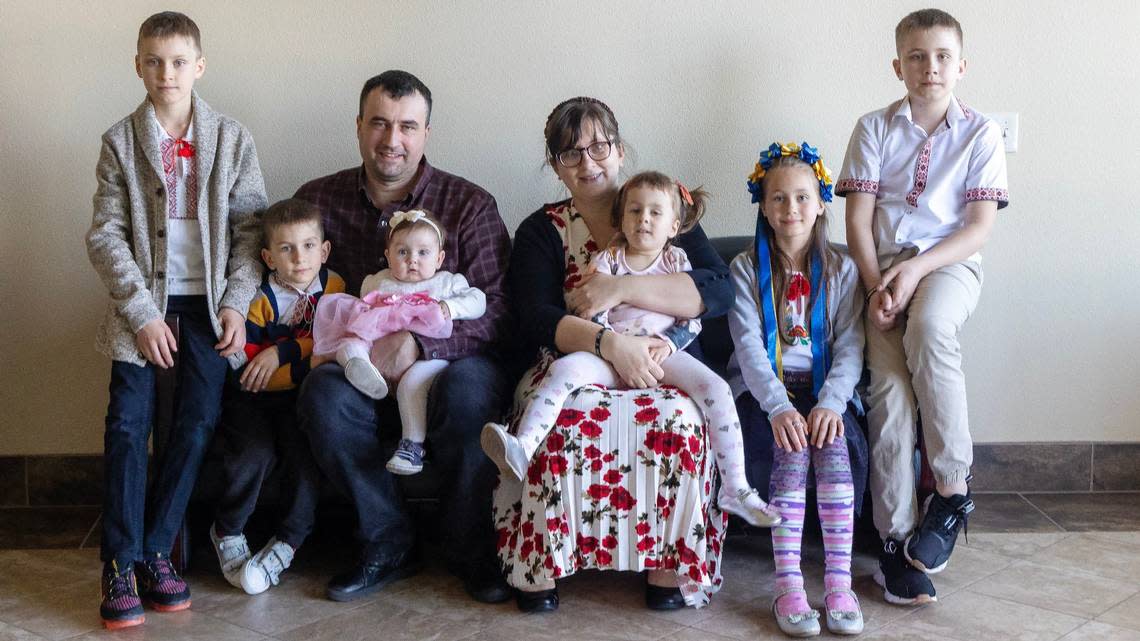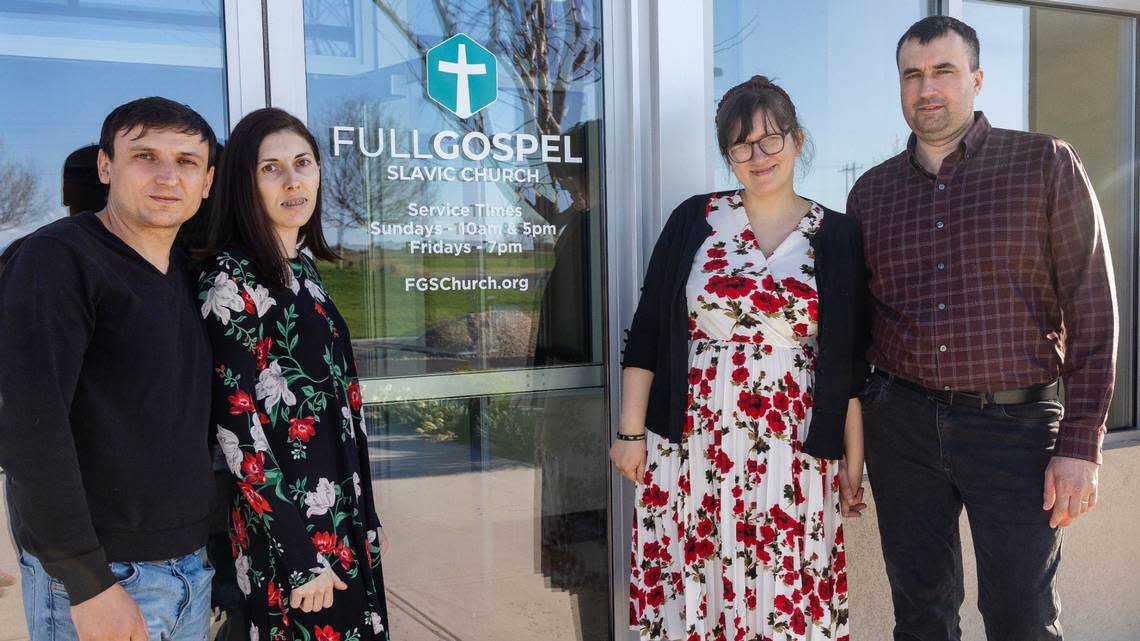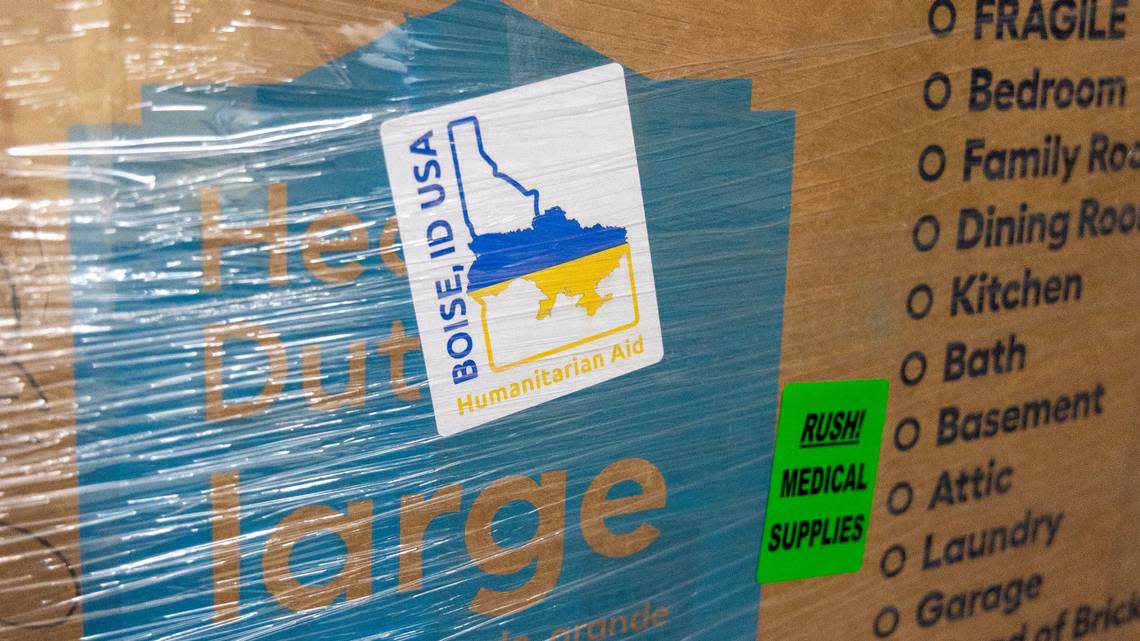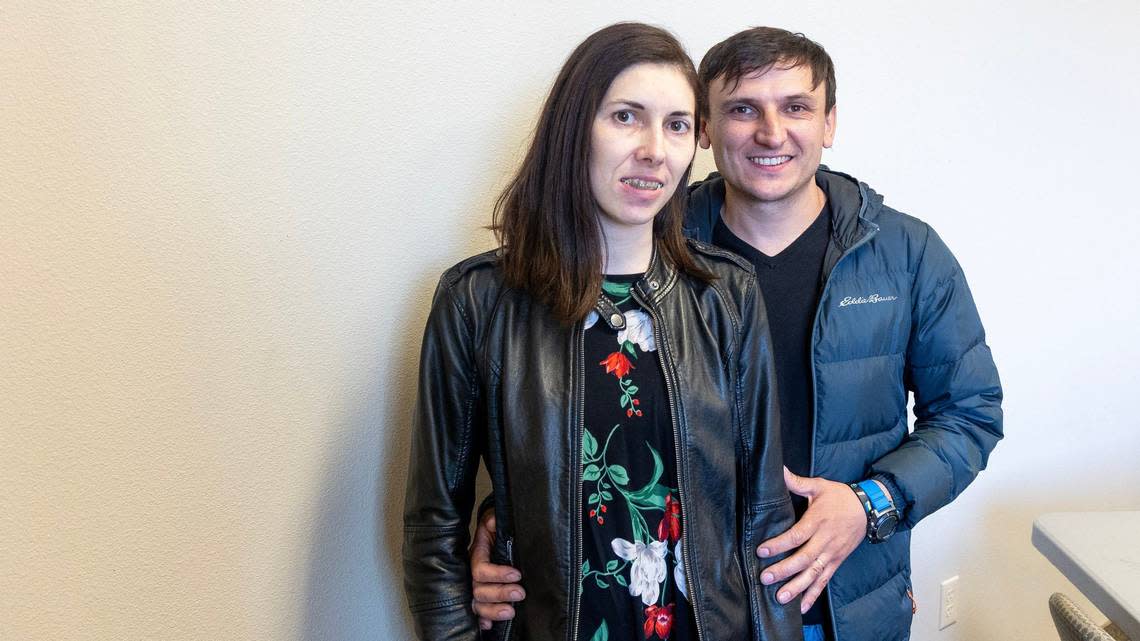Support for Ukraine is waning nationwide. But for one Meridian community, ‘this has not ended yet.’
For two years, Serhii and Yulia Marchenko tried to ride out the war in Ukraine. Along with their six children — the youngest now only 7 months old — they hoped to stay in the home they built in central Ukraine. Before the war, Serhii had planted grapes in their front yard, and a large garden and greenhouse full of potatoes and other vegetables.
But the children were suffering from the stress of the war, and they could attend school only online — or in claustrophobic basements.
“It felt like there wasn’t even enough air to breathe,” Yulia said.

After two years of endless sirens and sleepless nights, the Marchenko family finally left their home, arriving in the Boise area in March.
They wound up in Idaho in part because their family friends from their city, Oleksandriia, had fled here two years earlier. One of the friends, Volodymyr Molebnyi, and Serhii worked as welders. Both families were active in their church, the United Church of Christians of Evangelical Faith.

It can sometimes feel, the families said, like the world has moved on from Ukraine. Headlines about Israel and Gaza dominate today’s news, and many Americans’ desire to support Ukraine has lost steam. A December poll by the Pew Research Center found that nearly half of Republicans and 15% of Democrats believed the U.S. was providing too much aid to Ukraine, up from 9% and 5% in the first weeks of the war.
But at Meridian’s Full Gospel Slavic Church, where both families have become members and joined the choir, volunteer Leo Martsinyuk pointed to the parallels between the families’ stories, and the fact that they were forced to leave home two years apart.
“This has not ended yet,” he said.
The shifting economics of getting aid to Ukraine
That is what drives Martsinyuk and other local volunteers to press on with aid to Ukraine, even as the landscape — and their approach — shifts.
Martsinyuk, who moved to the U.S. from Ukraine years ago, is the lead coordinator of Idaho Humanitarian Aid, a nonprofit he founded at the start of the war to send food and medical supplies to Ukraine. Over the many months of war, its volunteers have refined their approach amid political and economic challenges, trying to stretch donations as far as possible.
In the early months of the war, the church gymnasium was packed with donated supplies and volunteers helping to sort. Back then, Martsinyuk led efforts to ship containers of supplies on trucks from companies that donated their time and equipment to Columbus, Ohio, a national hub for Ukraine aid. Eventually, the supplies made their way to Rivne in western Ukraine, where volunteers divided and sent on the aid in smaller vehicles that wouldn’t be a target for Russian attacks.
As of April, the front line of the war was about 600 miles long, compared with 1,500 miles when the war began. Roughly a fifth of Ukraine is under occupation, Martsinyuk said.
In the first days of the war, “you could see on TV, that there were 10 million people displaced, up to 15 (million). That’s very, very catchy for people to see. And that was a tragedy,” Martsinyuk said. Those dramatic images mobilized worldwide support for Ukrainians, he said.
“Two years later, I want to say thanks to God that we don’t have (those images) anymore,” he said. And that’s mostly a good thing, of course — but without such dramatic images on the news, some of the world’s attention has turned away.
And a more localized conflict just means the challenges have changed, not diminished, he said. There are still people living in towns and villages on the front lines. Many of those have stayed because “they have nowhere to go.”
As the war has dragged on, the economics of sending aid has shifted. Initially, Martsinyuk could get a shipping container of aid to Ukraine for a couple thousand dollars, he told the Statesman. In early 2024, he couldn’t find any companies willing or able to cover those trucking costs. That’s partly because of inflation, he suspects, and partly because helping Ukraine has grown more politicized.
This effectively doubled the price of shipping a container of supplies to about $4,500 in mid-March.
(In February, he said, workers’ strikes in Poland dramatically slowed the process of getting aid across the border into Ukraine, and the price spiked even further, to nearly $10,000.)
So the group has shifted its efforts to seeking monetary donations to buy supplies in Ukraine. Martsinyuk shared photos of dehydrated meals, made in Ukraine, that cost a fraction of the equivalent product in the U.S. With the exception of specialized medical supplies, many of the items Ukrainians need are available closer to home.
Their organization helps to fund mobile bakeries and soup kitchens that can travel from town to town near the front line, ready to quickly dismantle in case of Russian attack. For the people who remain in these towns — often the sick or elderly — these may be some of their only sources of food.
Members of the group, including Martsinyuk, still travel to Ukraine every few months with large boxes of medical supplies accompanying their luggage. They see for themselves the effect of their aid.

‘In survival mode’
On one of these trips in November, volunteer Lindsey Bohn brought along her violin. It was a last-minute decision that would have a profound effect.
Bohn, who plays violin at weddings and events in Utah, is affiliated with a Twin Falls-based organization aiding Ukraine. She found herself playing for elderly men and women waiting in line for soup or bread. Many became emotional upon hearing the music after months or years of trying to remain stoic.
“A lot of these people, they’re living in their basements, they’re in destroyed villages … A lot of them are very poor … and they have been through hell,” Bohn said. “They’ve had to put on a face of a stone-cold front to handle the pain and trauma.”
When they heard the music, she said, they “have the chance to cry, and they have a chance to feel for the first time in years. Because they’ve had to just be in survival mode for so long.”
Bohn and Martsinyuk visited a military hospital, where she played the Ukrainian national anthem for wounded soldiers. As she played, Bohn recalled, soldiers came out of their rooms to listen.
Bohn shared Martsinyuk’s reflection that the nature of the war has changed. There may be fewer people directly affected by the fighting, but the people left behind in villages along the front lines are some of the most vulnerable: elderly women, and farmers whose fields were mined, so they have no way to plant.
She expressed frustration at Americans’ willingness to “move on” from the war.
“It’s because it’s gone on so long, people are tired. In the United States, we’re tired of giving. Europe’s tired. And you can only imagine how tired Ukraine is at this point,” she said. “And Russia is just … pounding Ukraine so much, because of the lack of aid. They’re seeing this as a huge opportunity.”
Two years on, rebuilding lives
Soon after they arrived in the U.S. two years ago, Volodymyr and his wife, Iryna Molebna, began to volunteer with Idaho Humanitarian Aid, helping to collect and package donations to send back home.
Though their own lives were far from settled — for months, they lived with a Ukrainian family they met through Facebook Marketplace — it was an easy decision to send aid, Volodymyr said.
“It is not because we are so good, but because God works through our lives,” he said. “We feel that our family is there, that all of Ukraine is our family. We ourselves have experienced these difficulties, and we sympathize with them. We want to help them as much as possible.”

They expressed gratitude for their new lives in the U.S. Here, Iryna said, she has learned to drive a car and has been able to take English, business and computer courses for free at the College of Western Idaho.
They’ve each started their own companies: Iryna cleaning houses, and Volodymyr as a mechanic. Their children are in school.
They are eager to help any friends or family trying to get out of Ukraine. Two years into the war, they acknowledged, they can be part of a more established infrastructure for helping Ukrainian refugees get settled.
“When we arrived here, a family welcomed us. It was very difficult, and there were people who would tell them, ‘Why do they need you?’” Volodymyr said. “But love for people and compassion for them allowed us to meet anyway and helped them accept us. I think that’s the love of our God. They helped us. They set an example for us.”
And in turn: “We have helped more than one family come here,” he said. The family who welcomed them has “sown goodness, and it multiplied.”
